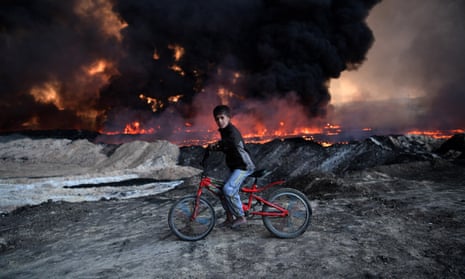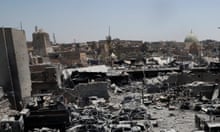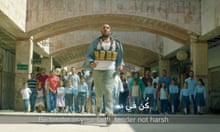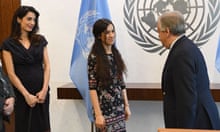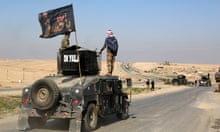When Laila learnt Islamic State was holding her son in an old school less than 100 miles from the refugee camp she now calls home, she could start to dream of a rescue attempt. Then, when she heard troops were advancing on the group’s last stronghold in Iraq, she even allowed herself to believe they might liberate her boy.
Days later the advance has slowed, there has been no mention of Yazidi captives by soldiers or politicians, and her despair has returned. “Hope is crushed,” she said. “Ever since we lost our kids, no one has done anything, planned anything to rescue them.”
She has no idea where her son is now, and is haunted by fears that he could be forced to die fighting for his captors or in an air strike, or be transported to Syria for new torments.
While the fight for Mosul is a key step towards dismantling Isis’s self-declared caliphate, for a group that has endured some of its most extreme brutality and violence, it only poses new dangers. Relatives say the liberating forces have forgotten hundreds of Yazidi women and children held by Isis as slaves in Mosul and are calling for attacking forces to add rescue missions – or at least details of where captives are held – to their battle plan. “We know there are more than 1,000 Yazidi captives – women, girls and boys – in Mosul,” said Ameena Saeed Hasan, a Yazidi activist recently awarded the 2016 Human Rights First award for her work running a rescue network.
“Although the operation to liberate Mosul started a few days ago, unfortunately there is no plan to rescue these captives: no one even asks the Yazidis where they are. It seems no one cares about these things, they just want to take control of the city.”
Many families, like Laila’s, have some idea where their captured relatives are held from reports via others who have been freed, smuggled details from local sympathisers or calls on stolen mobile phones. But the coalition of Iraqi forces, peshmerga fighters, Sunni and Shia militias and their foreign backers now marching on Mosul have ignored pleas to include rescue missions in their plans or even collect details of where captives may be.
“We usually cry when we watch the news,” said Kurte, 64, who lost three sons to Isis and asked not to be named in full because a teenage relative is still missing. She feared any criticism of Isis that the group stumbled across online might be used as an excuse to add to the girl’s torment. “Everyone is talking about the operation in Mosul,” she said. “We are afraid Isis might use our girls as shields to defend themselves, that the army might shoot the boys if they mistake them for Isis.”
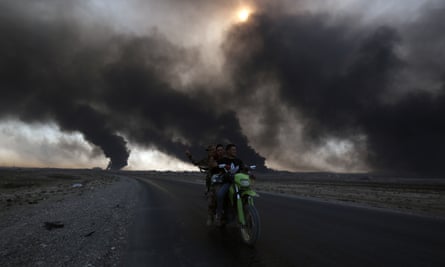
Since the jihadi group swept into Yazidi villages in the foothills of the Sinjar mountain in August 2014, murdering hundreds of men and taking women and children as slaves, 2,725 have escaped or been smuggled to freedom. But there are still more than 3,600 missing, according to the government’s office for rescuing captives, and international outrage at Isis’s revival of slavery has not been matched by any real push to save those who have endured it, their families say.
“Ever since we lost our kids, no one has done anything, planned anything to rescue them,” said Laila. “We don’t care how long we live in these camps as long as we can get our children back.”
Her son was just 10 when he was seized as the family fled. She is haunted by escapees’ stories of brainwashing sessions and forced conversion, and of videos of young Yazidi boys at brutal training camps where they are inducted into extreme violence. She fears anti-Isis forces might not even recognise him as a captive if he is compelled to fight. “He’s only 12 now so he won’t have a beard but maybe they have made him grow his hair and carry a gun, and wear clothes like a militant,” she said.
Two months ago a rescued girl said she had seen young boys a short drive from the refugee camp where Laila now lives, bringing a moment of hope that the family could try to patch together the thousands of dollars needed for a smuggler to get him out.
Even with activist smugglers working only for the cost of the operation, the price of getting a Yazidi captive to freedom can be as high as £16,000, a sum far beyond the reach of poor families living in refugee camps, or those with multiple missing relatives.
Now she has lost the only clue to her son’s whereabouts and Hasan said news of other captives has also dried up. “There were some girls and women in contact from Mosul, but since the operation started, I haven’t heard from them,” said the human rights activist.
She worries that the slower the advance, the longer Isis will have to transport their captives to Syria, and the fate of women held in other cities freed from Isis control offers a grim precedent.
“During the Falluja liberation, we heard some places had victims, but when we went to investigate, we couldn’t find them. The militants had already transported them to another place,” says Husain Qaide, head of the government’s official bureau for the rescue of Isis captives in Dohuk city, adding that Mosul and Tel Afar were two key centres for Isis’s disturbing slave trade.
He has appealed to the troops fighting around the city to block routes where they can to prevent women being moved to Syria at the end of a battle widely expected to be difficult and protracted, but to end in Isis’s defeat. There have been promises of help from peshmerga, though no action so far, and other forces have not bothered to respond.
Mosul residents confirm that enslaved Yazidis are still inside the city, where conditions for civilians are rapidly deteriorating. Some Isis fighters have already retreated to Syria, and those that remain are increasingly jumpy. “There are three Yazidi girls in our neighbourhood, in Kurdish Daesh houses,” said Abu Ali, a 24-year-old local using the Arabic name for Isis. He has been lashed twice by the group for minor offences. Although the organisation has little support, no one yet dares rise up against them, he says.
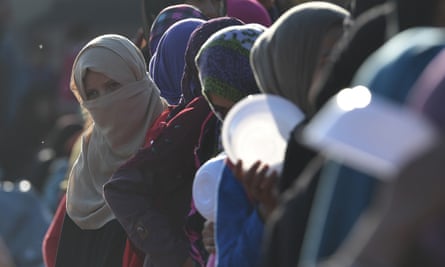
“People in Mosul are like a child whose parents hit him every day to behave,” he said. “Daesh is violent with us all the time – that is why people hate them. At my mosque we are around 50 people, and no one supports them.”
Even if they are eventually defeated, their reign of terror will leave a long and bitter legacy. The north Nineveh plains around Mosul were famously one of the most diverse places in the region, even if the city itself was dominated by Sunni Muslims.
One of the big questions hanging over the operation to rout Isis is whether that reputation for coexistence can be reclaimed after two years of sectarian violence and poisonous propaganda. Many minority communities now say they fear returning without protection.
They say Isis could not have conquered or ruled without local collaborators, who may still try to kill and harass. And a recent attack on the city of Kirkuk, more than 60 miles from Mosul and meant to be firmly under government control, was a reminder of Isis’s ability to spread death and destruction far from areas they control.
This week church bells rang out over the liberated town of Bartella for the first time in two years, and there was excitement that the famous arak drinks of nearby Bashiqa, another Christian centre, would be back in production. Still missing, though, are the worshippers and drinkers who once enjoyed them. Father Bools Mate Afram, head of the Orthodox Church in Bashiqa before Isis arrived said he would definitely return, but fears that many of his parishioners have set up new lives elsewhere, or are wary about security.
“I know many families who want to go back but they need international protection to be able to live in Nineveh plains again,” he said.
He fears Mosul’s community – almost as old as Christianity itself – is likely to be decimated because of worries that the violent ideology of Isis will live on. “Many Christians say that under no conditions will they return to Mosul city itself because the chances that it will be a secure and safe city, even after Daesh is gone, are very weak,” he said.
Yazidis, too, worry about moving back, even if Isis fighters and bombs can be cleared from their old homes. “Sinjar [in Nineveh province] was safe, but then everything was destroyed, and now we are afraid to go back,” said Kurte, who lost her health and her confidence along with her sons.
“We saw videos of our girls. We know what already happened there and are frightened it will happen again and again.”
Some names have been changed to protect relatives in Isis captivity.
